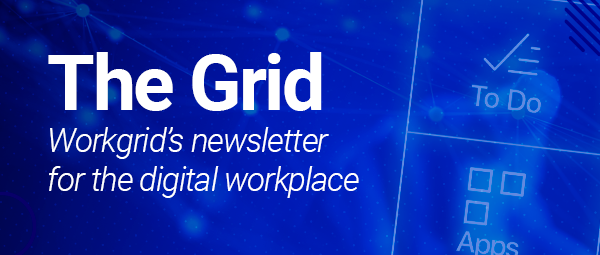Intelligent Workplace Chatter
Last week Workgrid joined a live TweetJam hosted by CMSWire. The TweetJam was focused around one of our favorite subjects, intelligent workplace technologies! As the interest in artificial intelligence and machine learning is quickly dominating the B2C market, it's no wonder businesses are starting to question how to start preparing for AI into the workplace.
We've taken the opportunity to summarize the key takeaways, predictions, and opinions from different industry-leading experts to provide you with an unbiased view into how organizations and industry experts are thinking about AI and the future of AI in the workplace. We hope as you consider implementing AI to support your workforce, these insights help you on your journey.
![[asset] AI-twitterjam](https://images.ctfassets.net/z7p73u8c0thn/6AuPpIKSWw9lWmgsvKddE7/3c9ae7450cfffd9a2cac57a143f8548c/twitterjam.jpg?w=1200&h=317&fl=progressive&q=60&fm=jpg&bg=transparent)
How can businesses separate the hype from the promise of AI in the workplace?
To separate the hype from the promise of AI in the workplace, organizations must first grasp an understanding of what AI actually is. As AI is becoming increasingly integrated into the workplace, there is more analytic research available to sift through. Read case studies, attend events, and learn the various uses for AI and the business outcomes for organizations that have already successfully implemented AI. It is important to realize that AI cannot be applied to all enterprise problems. For example, do not expect AI to provide ideas or creativity.
Next, identify a need. How can AI help you accomplish your goals? AI can give businesses a competitive edge, but what will that edge look like for your company specifically? Businesses should start small when implementing AI, experiment, then scale up -- all while documenting success and keeping objectives in mind.
A piece of advice that helps avoid putting AI on the technology hype list is don't use AI to solve problems that never existed in your organization in the first place. This is a common problem with new technology that often leads organizations to experience poor results because the new technology doesn't deliver any value to the workforce.
And remember at the end of the day workers don't care specifically about AI in the workplace or what any underlying technology is. Employees just want efficiency and the ability to understand how their contribution aligns to the organization's goals and business outcomes.
What areas in the workplace do you see AI/ML currently having the biggest impact and where will it in the future?
Today, AI is great at automating repeated tasks. AI can make sense of big data, identify trends, and categorize content -- performing tasks that many employees deem "boring." What's more, AI is helping solve human pain-points by enabling self-service and minimizing queues. Chatbots are great for this, and as the technology progresses, we'll see chatbots make even more of a positive impact on employee and customer experiences. AI will make company/ customer interactions more efficient while assisting call center employees. As more customer data is collected, companies will gain important insight into the voices of their customers.
Many agree that today AI is ready for the workforce when it comes to handling automating repeated tasks, enabling self-services, and speeding up knowledge work and in the future we'll see more autonomous automation with AI helping predict what employees need in the workplace before they even know they need it. The future of AI involves AI proactively reacting to needs -- as one user phrased it, "the AI of tomorrow should be able to predict what I need in the workplace before I even know I need it."
What foundational work do businesses need to complete before introducing "intelligent" technology?
The majority agreed that before introducing intelligent technology, a company should thoroughly understand its employees and gather information about their pain points, culture, and needs. Assessing business and employees needs and the objections or barriers to introducing change and laying out clean and concise goals before any investment is made is key for any new technology implementation. This insight will determine how AI should be integrated. To prepare for AI, having the right infrastructure and people in place to support and train it is imperative. Enterprises should have enough data to train AI as well as people ready to make sense of the findings. AI is only as smart as the data you feed it, so AI will need sources of qualified, verified, an accurate data to work from. To sum it up, one user said, "AI should compliment not disrupt the workplace. It should work with existing tools and platforms rather than introducing another avenue and more digital noise."
There is also much noise related to the fear of AI replacing workers. Organizations should make it clear to employees how AI will support their work and the implementation of AI is to allow them to do their job more efficiently. For employees that benefit from AI taking over redundant tasks once handled by the employee, the organization should think about how to potentially retrain their employees to augment employee skills and capabilities.
What specific problems do you think chatbots can solve for employees? Where do they fall short?
Customer-facing chatbots can free up service queues and solve the easier customer problems that wouldn't require an employee's help. Internally, chatbots can point employees in the right direction to important information and can complete unfulfilling tasks -- allowing employees to focus on the work that their customers and company derive more value from. Chatbots could even be considered a virtual HR. As chatbots become more complex, they'll be able to perform more intricate tasks, and programmers should always keep ethics in mind.
Will AI's introduction to the workplace help or hurt employees and their job prospects? Why do you feel one way or the other?
AI will be able to automate dull and time-consuming tasks. While this may hurt those who like repetetive jobs, it will give many employees the opportunity to learn new skills and focus on areas of the job that machines cannot complete. This dynamic may enforce human expertise rather than merely hurt employment. AI can be viewed as a double edged sword, but if implemented thoughtfully, it could help key aspects of a business and drive growth. If a company's sole aim is to cut costs, AI may hurt employees, but if a company wants to improve employeee engagement and customer satisfaction, Artificial Intelligence will benefit employees. AI will inevitably change the workforce, and people will either adapt or push back to the new era of technology.
What is a realistic timeline to achieving an "intelligent workplace?"
In many ways, the current workplace technology is already "intelligent," and the ongoing question remains: how do we make the workplace MORE intelligent? The road to AI is constantly evolving and will take many years depending on your business's culture, goals, and where your organization's tech is today. While developing an intelligent workplace may always be an overarching objective, companies can develop measurable milestones to put progress into perspective.
Like any new technology, artificial intelligence, machine learning and chatbots get alot of hype. Understanding how your employees could most benefit from these technologies and mapping out a journey for implementation into your workforce will help forward-thinking organizations succeed and realize ROI.
![[asset] purple-workgrid-banner](https://images.ctfassets.net/z7p73u8c0thn/7DThwmNKvJS32HzzcFYcT0/3ee77d4a180252b62c5d2c47650558e2/intelligent-workplace-chatter.jpg?w=1600&h=400&fl=progressive&q=60&fm=jpg&bg=transparent)



